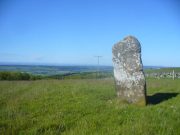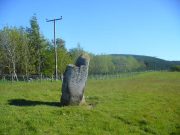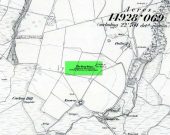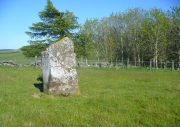Standing Stone: OS Grid Reference – NO 02182 11809
Also Known as:
- Big Stane
- Canmore ID 26681
- Grey Stone
- Maormar‘s Stone

Take the B934 road south, uphill, out of Dunning, for 2.1 miles (3.4km), past Kippen, past Pitmeadow and past Quilts. It’s the track to Knowes that you’re after! Along this track, keep to the field-side on your right, following the edge of the fencing until you reach the small copse of trees. At the far side of the trees a gate takes you into the field with the standing stone, which is just over 100 yards to the north. You can’t miss it!
Archaeology & History
Although mentioned in several folklore works and just a couple of archaeology tomes, almost nothing has been written about this large upright standing stone. A very bulky stone nearly seven feet tall, it has been broken into pieces at sometime in the recent past but, thankfully, good locals put the stone back together and placed it upright once again. Its position in the landscape is quite superb, overlooking the lowlands of Tayside below and then far into the rising mountains of Perthshire and beyond, easy fifty miles or more.


Shown on the earliest Ordnance Survey map of the area, the name of the stone is somewhat of a puzzle, for in a lot of cases ‘gray’ stones are found on local boundary lines—indeed, the name gray stone and boundary stone are interchangeable in many cases—yet the nearest boundary from here is some distance to the east. It may simply relate to the colour of the rock (although this is unlikely). Whatever its reason, it’s an impressive stone and is well worth checking out!
Folklore

The local farmer told that the field where the Grey Stone lives was known as the Big Stane Field. Makes sense! Legend has it that the Gray Stone was the burial place of Maormor, the Steward of Atholl in the Battle of Duncrub, after dying in Thanes Field (Watson 1995), on land to the north of Dunning village in 964-5 CE.
References:
- Holder, Geoff, The Guide to Mysterious Perthshire, History Press 2006.
- McKerracher, Archie, Perthshire in History and Legend, John Donald: Edinburgh 1988.
- Swarbrick, Olaf, A Gazetteer of Prehistoric Standing Stones in Great Britain, BAR: Oxford 2012.
- Watson, Angus, The Ochils: Placenames, History, Tradition, PKDC: Perth 1995.
© Paul Bennett, The Northern Antiquarian
The map could not be loaded. Please contact the site owner.